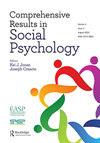阴谋论者的信仰不一致
引用次数: 12
摘要
摘要本研究探讨了阴谋论信仰与双重思想的关系。特别地,它评估了阴谋思想(信仰和理论)是否与信仰不连贯(双重思想)的倾向有关。总共有257名成年人完成了在线调查。阴谋思想与信念不连贯正相关。考虑了研究的意义和局限性。本文章由计算机程序翻译,如有差异,请以英文原文为准。
Belief Inconsistency in Conspiracy Theorists
Abstract This study investigated the relationship between conspiratorial beliefs and doublethink. Particularly, it assessed whether conspiratorial ideation (beliefs and theories) was associated with proneness to belief incoherency (doublethink). In total, 257 adults completed online survey measures. Conspiratorial ideation was positively associated with belief incoherency. Study implications and limitations are considered.
求助全文
通过发布文献求助,成功后即可免费获取论文全文。
去求助
来源期刊

Comprehensive Results in Social Psychology
Psychology-Social Psychology
CiteScore
3.40
自引率
0.00%
发文量
7
 求助内容:
求助内容: 应助结果提醒方式:
应助结果提醒方式:


